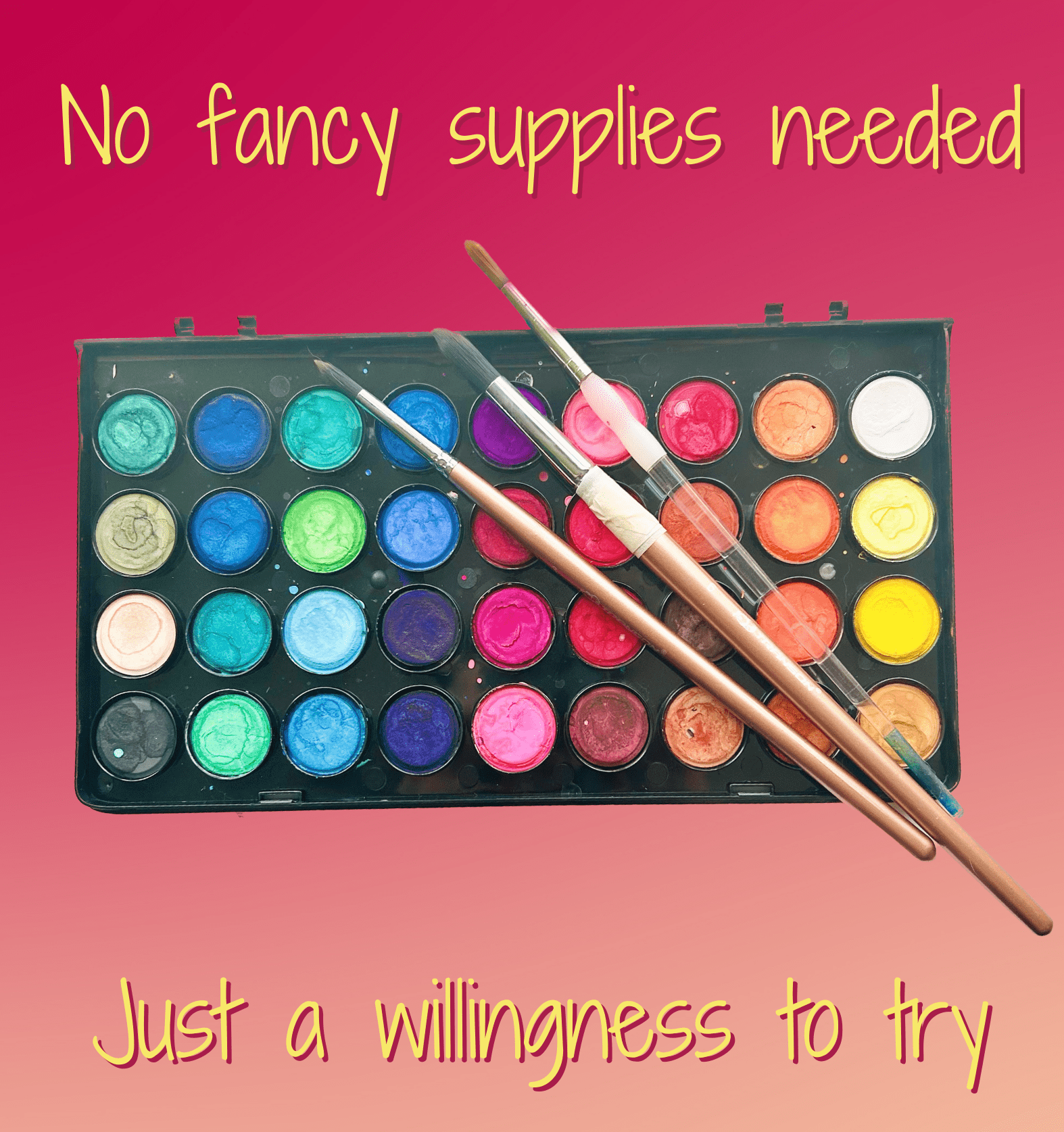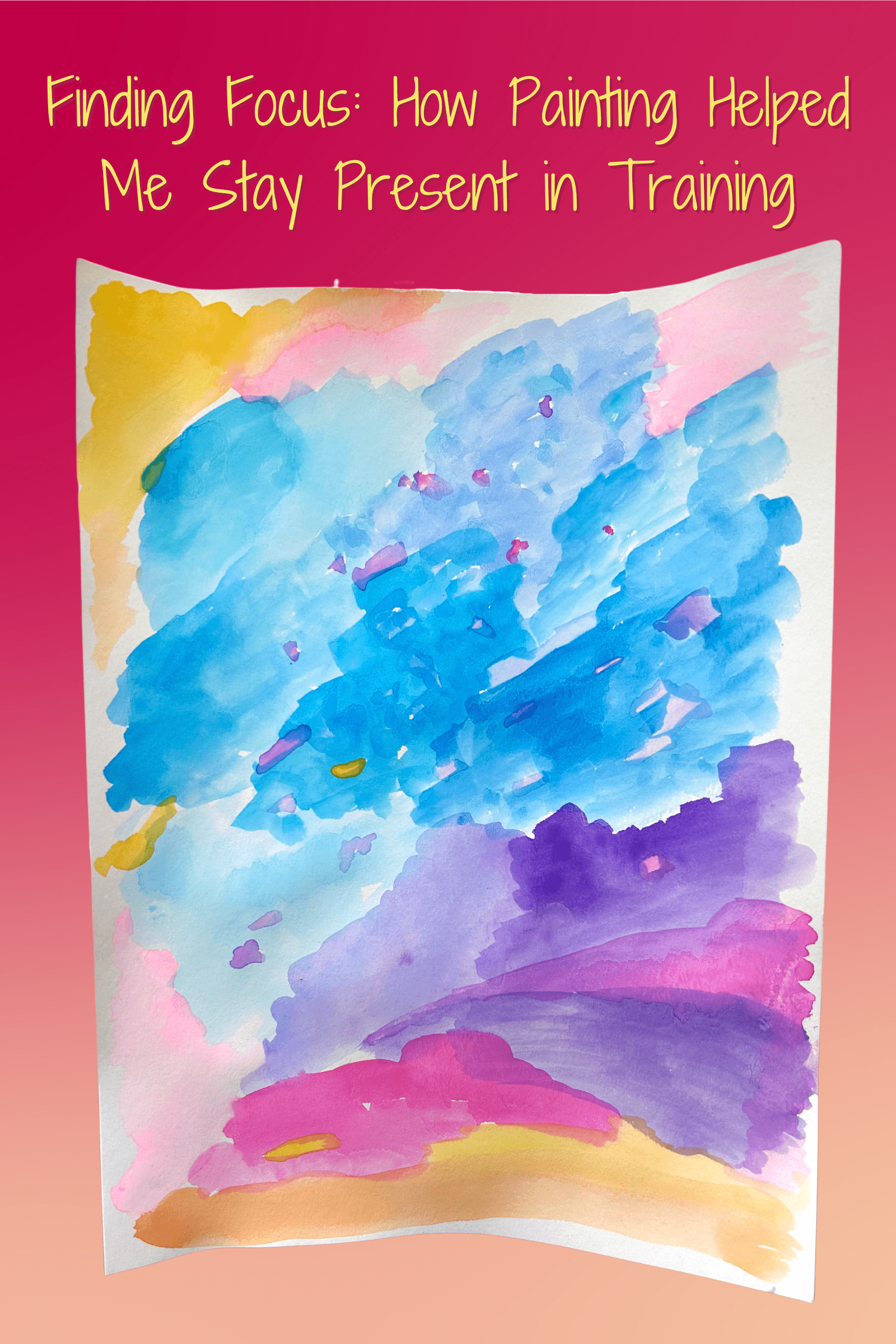Finding Focus: How Painting Helped Me Stay Present in Training
This is a 7 minute read. If you would prefer to listen, click here.
If you’re someone who struggles with staying present when experiencing big feelings, this post is for you.
Yesterday, I was feeling a lot of emotions, quite unclear to me, but still heavy. My second training session for Mental Health First Aid for Online Community Managers was also yesterday, and I wanted to do my best to learn and engage, especially because I knew that my brain was thinking of all the things I could do while “being in training” (part-time work, work for my stuff, browsing, literally anything else). How could I stay present?
Acknowledging Emotions and Setting Intentions
I realized that I will have to be more active in my attempts at listening and paying attention to this training, due to all of the other emotions I was having. At the beginning of training, I put in the chat that I was feeling sensitive and that I was looking forward to learning. I could tell that I was starting to drift away already when some of the material was stuff I kind of already had heard of.
I knew I wanted to stay engaged not only for the sake of learning something potentially new about the said concept, but also because I knew I had intentions to stay engaged (I think typically I tend to ignore it and do what I want). So, after talking back and forth in my head about whether or not painting random colors would allow me to let out enough energy to stay engaged or if it would end up distracting me differently (i.e., paying too much attention to which color or placed where or does it match), I decided I would try it out.

Trying out new strategies
Our sessions last 3 hours and they give us a little break every hour. During the first hour, I think I did a pretty good job because I had a few thoughts arise that I decided to type into the chat (not many others had typed much commentary, so I was testing the waters) which seemed to be relevant.
One of the agreements in the training is that we all have our cameras on, for the sake of confidentiality and being able to see who we’re talking to. I had my camera pointed up to where you could see my face and shoulders, and couldn’t see that I was painting. I had my watercolor paper and paint in front of me and let it flow. I didn’t think twice about the colors I chose, where I put them on the page, or what shape they were in. My goal was to use it as a “fidget” in a way.

Making meaningful contributions
In the second hour, I suddenly raised my hand to comment when the quote “Stress occurs when perceived pressure exceeds your perceived ability to cope” appeared on the screen.
I felt a quick variety of emotions about that. I immediately felt a bit defensive, as if the definition of “perceived pressure” was invalidating my stress as something I could handle, no matter what.
And then I reread it a few more times and thought about what that meant. And my mind brought me to “Well, what do you (Jen) do when you’re at that point of darkness and you’re like ‘What is the freaking point?’ You remember how you learned about Viktor Frankl. You haven’t read his book yet, but you know he was quoted in one of your favorite books. And how when I lose control over everything in my environment, I still have control over how I respond to it. He came to this conclusion WHEN HE WAS IN A CONCENTRATION CAMP IN THE HOLOCAUST. I can figure this out. Somehow.” So I shared that with the group.
The trainer nodded and picked up right where I had left off with just that bit of information and was able to elaborate more on who Viktor Frankl was and actually how his book was written, and related it to what we were talking about.
Recognizing personal growth
It was after sharing that I realized I had talked to one of my mentors the day before about how I admired her way of being able to speak so… informed and helpful(?) about the information she was sharing with someone else, and how it has impacted her life. And I said, “I can’t wait until I can speak about things like this without having to need so many references.”
She pointed out that I do that already and that it takes time. I don’t always need resources because I have a lot of knowledge and experience that is often relevant as well. And it’s part of the journey of life to continue to learn and apply that knowledge.
Yes, I have trouble with information recall AND I tend to still know what I’m talking about in regards to the sources and information I have learned and situations I have experienced that have put those sorts of lessons or theories into real, active perspective. I appreciate the call-out because she was inviting me to continue to live in the present, appreciate and trust what I do know, and then acknowledge that these things will come over time.
“I don’t always need resources because I have a lot of knowledge and experience that is often relevant as well. And it’s part of the journey of life to continue to learn and apply knowledge.”
.
Giving myself credit
I do speak profoundly about my experiences and the information I have learned. When I am in my head and nervous, that’s when I start to feel like I need specific resources for reference.
Me being able to read Viktor Frankl’s quote “Everything can be taken from a man but one thing: the last of the human freedoms—to choose one’s attitude in any given set of circumstances, to choose one’s own way.” wasn’t necessarily needed in that moment, because I was able to get my point across and contribute to the conversation in a really helpful way. Not only that, I also didn’t feel the need to grab my book and reread the part I was thinking of, to make sure everyone understood me.
By choosing to engage and feel confident in what I had to share, I got to learn more about Viktor Frankl and hear reflections and thoughts from the trainer and other group members. Had I not shared, I wouldn’t have gotten to learn more.
Had I not figured out what sort of accommodation would work for me to be able to actively listen despite having a lot of brain thoughts, I may not have even come up with the thoughts I shared. Painting helped me let the random energy out and stay grounded and present.
Conclusion
I felt really empowered after that training session. I felt really refreshed and confident. Thursday was a challenging, yet rewarding day. It required me to practice staying present and engaged, to the best of my ability. While there were some areas where I felt less confident, there were also areas where I thrived and was able to contribute really thoughtful ideas. I am really proud of myself for coming up with the idea of painting to help regulate my emotions, and I am grateful that it was so helpful.
I wanted to share this experience with you all because sometimes all we can do is try. Try something new. Try something you heard someone else had success with. For me, it was painting mindlessly while paying attention to my training. Keeping my hands busy helped me be present.
What strategies do you use to help yourself stay engaged while feeling really big feelings? I would love to hear about them.
Love, Jen
P.S. If you are ever looking for a space to talk about these things and brainstorm new ideas, I invite you to our live stream, Breakfast and Feelings Check-In on Twitch. If you’re looking for more one-on-one, I offer Peer Support Sessions for an affordable price.
If you prefer to listen to this blog instead of read, you can click play below:
Subscribe to the ArtHubb Newsletter to receive news, updates, & more!



